Student Case Studies
During the MIBTP Programme, our students have the opportunity to undergo widely different experiences from one another, often tailored highly to their specific interests. We have reached out to our current students about many different aspects of their experience, so that we can provide detailed case studies covering the full MIBTP experience.
Student Profiles
Sotiria Boutsi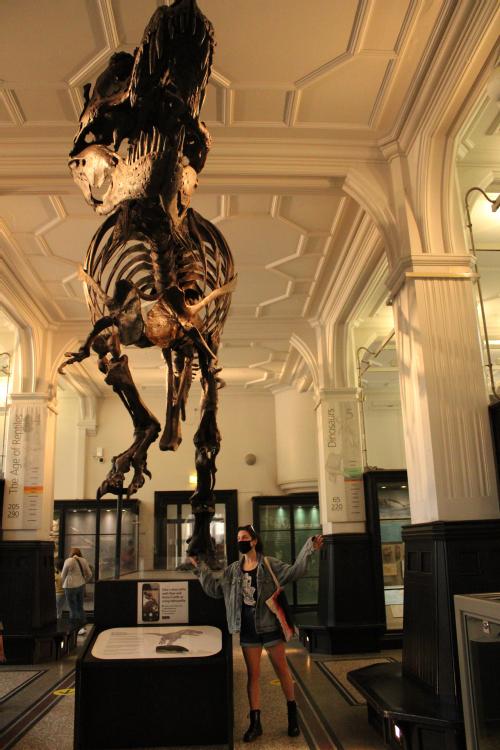
Harper Adams University Previous Qualifications: BSc Biology in Aristotle University of Thessaloniki (Greece) About me: I've always had an interest in the natural sciences. Through my postgraduate studies, I got involved in the evolutionary ecology of plant-insect interactions and I got to spend a lot of time with PhD students. That was when I started thinking of continuing with education in a doctorate program. In the search of funded PhD programs in Europe, I came across a project about genomics of speciation in figs and fig wasps. I was very attracted to the project description and it seemed like it had the potential to give me the skill development I was looking for. Later down the line I realised that it was part of MIBTP. Initially I was sceptical about the training period as I really wanted to start my research project soon after 6 years of previous studies. Eventually, I decided to apply. It was the first PhD program that I applied for, and got accepted, so I had enough time to consider if it would be suitable for me. I was unsure of how the training year would go. Still, I packed my bags and came to the UK for the first time. (In retrospect, the training time was really worth it!) I'm currently working on speciation genomics in the mutualistic system of figs and fig wasps. My interests however do not stop in the plant-insect interactions world; I'm fascinated by all aspects of evolutionary ecology, including plants, animals and microorganisms. MIBTP is a program that can help you develop a wide variety of skills. It is suitable for those who want to challenge themselves by diving into themes not directly related to their research interests. It works well in providing quantitative experience in research methods thought the thought modules, as well as in work experience through the placement. Moreover, as MIBTP students, we have access to opportunities, training, networking and resources in all collaborating universities, which is a real plus. |
Ivana Del PopoloUniversity of Warwick Previous Qualifications: BSc Psychology University of Leicester (2:1) About me: I was suggested to apply to this program following a conversation with my MRes supervisor on most suitable PhD programs for bioscience in the Midlands. My research interest is on understanding the neurophysiological and chemical processes that occur in specific regions of a mouse brain following a model that resembles schizophrenia in humans. My post PhD plans are to dedicate my work on research and apply for post-doc positions in neuroscience. |
Edward Mathias
University of Birmingham Previous Qualifications: MSci Biochemistry with Professional Placement at The University of Birmingham About me: I wanted to apply what I had learnt in my undergrad to impactful research. There was a broad range of projects offered through MIBTP many of which interested me making it an attractive programme to apply to. After discovering the projects, I learnt the further benefits MIBTP offered such as the collaborations between the Unis on the programme as well as the chance for mini projects away from the main project. I felt I would get more out of a PhD on this programme than a standard 3 year project. I am interested in many areas within cancer research however I also enjoy learning of the vast roles of the microbiome. My project is based within cancer research however I am able to carry out research on the microbiome through my mini project. I don't have any clear plans following the PhD however at the moment I am thinking of staying in academia and maybe even lecturing. I think if you are interested in starting a PhD but not 100% sure in what area, applying to MIBTP is a good option. The first year allows you to explore your research interests which you can develop into a finalised project. |
Elaine MercerUniversity of Leicester Previous Qualifications: BSc Psychology: 2:1 (The Open University) About me: Having worked as an accountant for a number of years, I was looking for a career change into academia. I applied to the MIBTP scheme / PhD project because it offered a good opportunity to develop an academic career within a research area of interest to me. In particular, I thought that the MIBTP scheme would be better for me than a standard PhD because the structured training opportunities would allow me to stand out from the crowd when applying for postdoctorate positions. I am interested in using cognitive neuroscience methods (e.g. electroencephalography) to study visual perception/cognition in the brain and how this changes as we age. My post PhD plans are to continue within academia in a postdoctoral position if possible. However, following completion of an MIBTP internship, I am also interested in public engagement and see this as a back-up plan. I would recommend applying to MIBTP if you are looking to develop a career in academia as I believe the structured training opportunities will help you to stand out in the competitive world of academia. |
Jo De-Klerk
University of Warwick Previous Qualifications: Bachelor of Veterinary Medicine (Hons) & Masters in Tropical Animal Health About me: I graduated as a vet in 2014, and spent the next two years volunteering for several NGOs across Africa. During this time, I developed a strong interest in One Health, and bigger-picture global veterinary medicine. I saw the struggles first hand, and began to understand why some of the areas I worked in were hotspots for emerging infectious diseases (EID). So in 2017, I began to pursue a career in epidemiology and One Health, by taking on a part time Masters in Tropical Animal Health. Here I learnt about drivers of EIDs, surveillance, public health and epidemiology. My PhD is the next step in my journey to develop the skills I've so far gained. My research interests are zoonotic infectious diseases; both emerging, and existing. My PhD thesis focuses on epidemiological modelling of outbreaks, and brings in elements of GIS mapping and One Health control measures. I would recommend applying for MIBTP because of the support and extra training which is provided during the course. The first year of teaching and mini research projects bridges the large gap between Masters level and PhD level research, as well as provides plenty of opportunities to develop transferable skills. |
Jasmine Stanley-AhmedUniversity of Warwick Previous Qualifications: Biomedical Science (BSc), 2:1 &Applied Sciences (MRes), Distinction About me: I worked as a laboratory technician and demonstrator at the University of Chester for 5 years after completing my MRes. During my time as a demonstrator I really enjoyed teaching the students new techniques and during my MRes i discovered my passion for research so I wanted to combine the two and look towards becoming a lecturer. A PhD is the perfect opportunity to pursue this goal and to learn even more techniques and gain resources. I'm interested in immunology and haematology, in particular the body's interaction with cancer and movement of immune cells. As a mature student returning to full time education after 5 years I found the training year a great way to catch up on advances in statistics and programming that I have missed during my time in employment. |
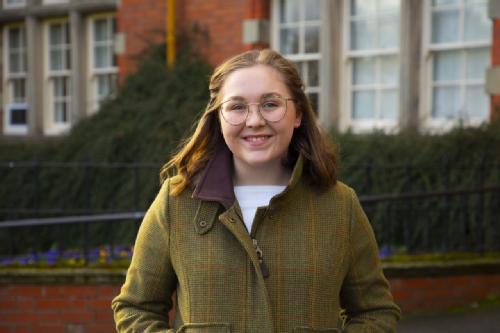
Aimee TonksHarper Adams University Previous Qualifications: First class BSc (Hons) Wildlife Conservation with Natural Resource Management (Harper Adams University) Distinction & MSc Integrated Pest Management (Harper Adams University) About me: During my time at Harper Adams, completing my Undergraduate and Masters degrees, I became increasingly aware of the pressures facing the agri-food industry and commercial growers in the 21st Century. The need for more researched and evidenced holistic pest management tools and techniques is greater than ever, and I wanted to be one of the people contributing towards finding these solutions. MIBTP provided the opportunity to conduct relevant, high quality research with a focus on sustainable agriculture and food, supported by the learning of quantitative skills necessary for much modern research. Whilst allowing students the focus of a PhD research project, undertaking a PhD with MIBTP encourages the development of students into well-rounded researchers and scientists through the diversity of courses and masterclasses. I am interested in the development of biopesticides for use in UK commercial crops, with a particular focus on overcoming the limitations associated with biopesticide use in oilseed rape. My PhD focusses on the evaluating the efficacy of biopesticides on economically important oilseed rape pests (such as cabbage stem flea beetle, Psylliodes chrysocephala, and turnip yellows virus vectoring peach potato aphid, Myzus persicae), and addressing barriers to their use including, cost, high application frequency, large water volume requirements and environmental sensitivity. Post PhD, I would like to continue research and development of biopesticides for use in integrated pest management in the UK, with the hopes of helping future generations achieve food security through development and education. |
Mihails LaskovsAston University Previous Qualifications: 2:1 BSci Hon Molecular Biology About me: My interest is in lipid metabolism of fruit flies during ageing. Just like humans, flies accumulate fat during ageing which has been linked to age-related metabolic disorders. I am employing molecular and genetic tools in combination with lipid mass spectrometry to dissect lipid pathways and species responsible for age-related disorders associated with lipid accumulation during ageing. I would like to pursue a career in either academia or industry. |
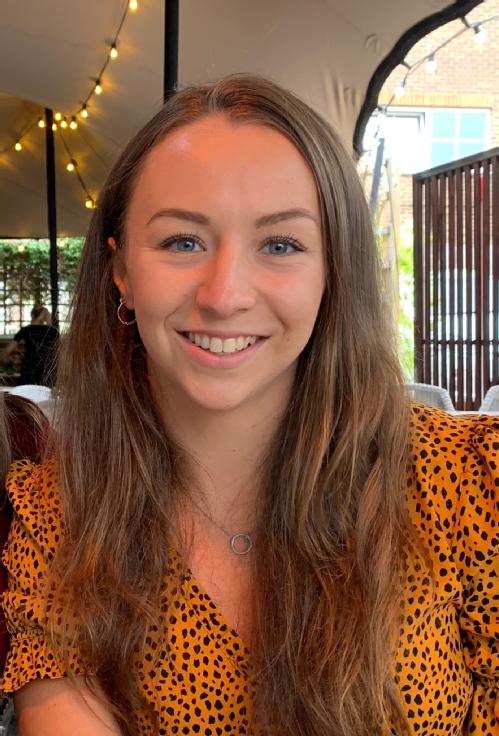
Hannah JohnstonUniversity of Birmingham Previous Qualifications: BSc Biochemistry at University of Birmingham (1st class with honours) & MRes Molecular and Cellular Biology at University of Birmingham About me: During my MRes degree I realised how much I enjoy doing research and I wanted to continue doing research through a PhD. I wanted to continue studying at Birmingham and the MIBTP programme offered a project I was interested in at Birmingham. A PhD as part of the MIBTP programme also allows me to learn and develop both my research skills and wider transferable skills meaning I have options in my career path after the 4 years. I have a wide interest in antibiotic resistance and structural biology with my PhD project focusing on transport pathways to form the highly drug resistant outer membrane of Gram-negative bacteria. After completion of my PhD, I am currently planning to stay in research, either in industry or academia. Alternatively, I am interested in science communications and/or outreach projects as a non-research career path. It is a great opportunity to meet other new PhD researchers and learn new computational skills during the training. It is a challenging but exciting opportunity to progress in scientific research. |
Zuzana PalečkováUniversity of Warwick Previous Qualifications: First Class BSc in Applied Biological Sciences About me: I applied to MIBTP to obtain a training in programming, data science and statistics, as I did not have a strong background in those essential areas. I also appreciated the collaboration this program offers with the remaining universities and companies through the mini-projects and PIPS. For the actual PhD project, I was excited about the independence, exploration and professional and personal growth a PhD brings. The idea of developing new methods, exploring and interpreting data and meeting with like-minded people was thrilling. I am interested in bacterial pathogens and research in treatments against them. It is the possibility that I can improve or save someone's life with my research that motivates me. Before I started my PhD at the University of Warwick, I was certain I would continue my career in academia. However, I am exploring new possible paths which involve industry, further education in a different branch such as business and management or in education, and so I am keeping my eyes wide open. I would recommend applying to MIBTP because of the training year and the possible collaborations with other universities and companies students can have through the mini-projects and PIPS. I now am a very different scientist than I was before I started the MIBTP program. I acquired skills that I never thought I could acquire with a level of competency that allows me to use them on a daily basis. In addition, being part of a large cohort enabled me to develop friendships in many different areas of science, making my PhD experience more colourful. |

Annelise GarrisonAston University Previous Qualifications: 1.1 MSc Regenerative Medicine - National University of Ireland, Galway 1.1 BSc (Hons) Pharmacology - National University of Ireland, Galway About me: My interests were perfectly in line with the research topic I applied for, the interdisciplinary training, the mini-lab placements and industry placements opportunities, the support network across multiple universities, moving abroad. I am interested in pharmacology, regenerative medicine, and tissue engineering - in particular, stem cells, ex vivo models of disease, and translational medicine. I am hoping to stay in the field in the future whether it be as a postdoc or in an industry position. |
Kyprianos MichaelidesAston University Previous Qualifications: University of Manchester - Pharmacy (MPharm) About me: My motivation to apply for a PhD was my desire to develop and have an everyday challenge rather than just settling in community pharmacy. At the moment I am working on controlled release injectable formulations e.g. single administration vaccines but I am also interested in other forms of parenteral administration. MIBTP is well organised and provides useful training. |
Panagiotis Patsis
University of Leicester Previous Qualifications: Bachelor of Science in Biology, Aristotle University of Thessaloniki, Greece About me: I wanted to continue my studies and evolve as a scientist by doing a PhD. I wanted to delve deeper in a subject of basic science, such as structural biology, and to investigate the mechanisms that govern a biological function. I am interested in studying the mechanisms of molecular interactions in the context of a biological process and specifically I am interested in investigating the relationship of structure and function of biomolecules. Regarding my post PhD plans, I am thinking of continuing with a post-doc and then maybe switching to industry (not sure yet). I would recommend this scholarship program to others, because i like the way it is organised, the training year with the classes that focus on quantitative skills, the different mini-projects at the different universities, as well as the internship opportunities. It is a good experience so far. |
Rebecca SandersAston University Previous Qualifications: BVSc Veterinary Science (graduated Liverpool 2011) & MSc Sustainable Agricultural Technologies - (period of study 2020-2021) Sheffield About me: After working as a meat-industry veterinarian for several years, I was sick of working in animal exploitation, and wanted to do something to reduce the environmental and animal-welfare burdens of modern agricultural practices. I want to be part of the solution for a change! I'm researching scalable production of cultivate meat. Post PHD, I'm hoping to work in the cellular agriculture industry - it's still an industry in it's early stages, but I have high hopes this could be a transformational technology in the effort to combat climate change. |

Oluwatosin OrababaUniversity of Warwick Previous Qualifications: BSc. Microbiology (First Class) (2016) - University of Lagos, Nigeria & MSc. Microbiology (Distinction) (2021) - University of Lagos, Nigeria. About me: I am passionate about research and have always wanted to carry out research on antibiotic resistance and discovery of new antimicrobials. Hence, my reason for applying to MIBTP as I found a research area that aligns with my interest under the understanding the rules of life research area. Also, looking through the modules of the program before applying, I noticed the program is highly packed and aims to give the best training that will be useful both within and outside research. These were my motivation for applying to the program and so far, I have not been disappointed. I am interested in studying antibiotic resistance in clinical pathogens most especially those that form biofilms (mono-species and dual-species biofilms) and discovery of new antimicrobials from natural products with strong efficacy against these pathogens. After my PhD, I plan to go into continue research on antibiotic resistance and discovery of new antimicrobials, and also take up a lecturing job in a tertiary institution. I am passionate and research and teaching. I personally think MIBTP is one of the best training programmes for PhD students due to its intensive training method that equips PhD students with both quantitative and qualitative research skill. The modules also include lots of hands-on sessions that aid better understanding of the modules. Also, the lecturers and teaching assistants are quite friendly and accommodating which makes learning easier. |
Sissi SpiritosantoUniversity of Warwick Previous Qualifications: First class honours BSc in Biotechnologies (Italy, 110/110 with honours). Erasmus Traineeship during the last year at Nottingham Trent University. About me: I wanted to do a PhD because not only it would enrich me with invaluable technical and transferable skills, but also it would prepare me for my future career plan, which is to pursue a career in academia. The BBSRC-funded MIBTP programme gives the opportunity to young researchers to further develop as multi-tasked scientists, thanks to the training program offered in the first year, and generous funding to sustain research costs and participation to conferences. The MIBTP programme offered me the possibility to change my area of work and explore new research avenues. In fact, you do not directly apply for a specific project; therefore, you do not need to have already specific technical competencies beforehand. This is usually particularly limiting when applying for other PhD programmes. In my PhD, I am working on developmental biology working mainly in vivo using the zebrafish embryo as a research model. After my PhD, I intend to continue my career in academia by starting with a post-doctoral research fellowship in an institution relevant for my research. I would recommend applying to MIBTP because of the training program that it offers, in terms of lectures in irrelevant subjects and lab rotations. You don't have to choose a project until the end of the first year, making it ideal for those who is yet unsure about their research interests and passions. The funding provided is also generous. |
Joe Collins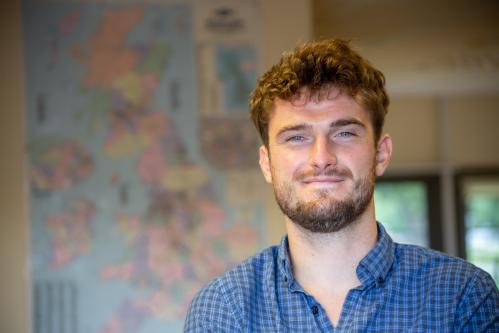
Harper Adams University Previous Qualifications: BSc (Hons) Agriculture with Crop Management - Harper Adams University & MSc Sustainable Crop Production - University of Warwick About me: I have worked in the agricultural industry for 10 years as a farmer and in research. During my time at work, I saw the importance of creating more sustainable and resilient farming systems to address some of the environmental and food security issues facing the world today. I applied for a PhD because I wanted to improve my skillset and learn more about a subject that fascinates me. I am interested in agricultural system management and its effect on productivity, soil health, and greenhouse gas emissions. Following my PhD, I hope to continue to gain skills and experience working in a role helping to conduct academic and farmer-led research. I would recommend applying for the MIBTP because of the support and training provided during the PhD journey. |
Clifton LewisUniversity of Leicester Previous Qualifications: 1.1 Genetics at University College Dublin About me: I decided to apply for this PhD because the project was interesting with the opportunity to apply cutting edge genomics technologies such as single cell RNA-seq to understand the problem in the best resolution. Additionally, the project also would equip me with the bioinformatic skills to analyse large-scale genomics data. In the current day, having a mixed modal approach of both dry and wet lab expertise is crucial for success in academia while also allowing for a better understanding of the problem at hand. The MIBTP programme seemed like a brilliant programme that would aid in my career development as a PhD student as additional elements such as the industrial placements and small project work would help me to develop a strong basis upon which to craft my PhD project. Currently, I have both academia and industry plans for post-PhD. I believe that it is important to consider all options available with regards to a career in order to ensure the best option, that suits me, is chosen. The scope for research within academia really does inspire me to investigate some research ideas I have had. However, I do think I will aim to spend at least some time plying my trade and expertise as a PhD graduate within industry. This career development plan is a work in progress and as such all potential avenues are being considered. I believe the MIBTP programme is a great doctoral programme as the first year really helps to get you into the mindset of a PhD student as well as giving you a vast range of skills through taught course in the first semester to direct project work in the latter stages. This really helps to develop one's own confidence as a PhD student. Additionally, the opportunity to do an industry placement is quite exciting as it gives you the scope to explore things outside of the academic setting. |
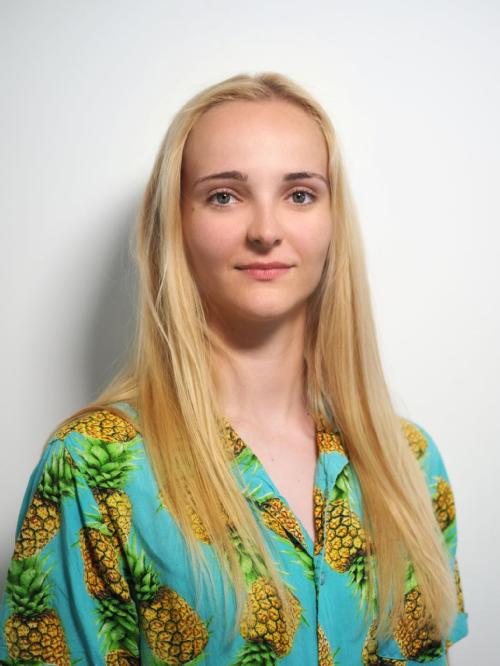
Paulina MichórUniversity of Warwick Previous Qualifications: University College London 2016 - 2020 About me: I had an amazing 4th year dissertation supervisor, who showed me that research day-to-day life can be amazing and fun. At the same time, I wanted to gain other skills, such as programming. MIBTP was a perfect place to apply to as it provides interdisciplinary training and opportunity for an industrial collaboration. I was also specifically interested in working with my supervisor in his field of neuroscience. I am interested in metabolic activity in and metabolic support of malperfused brain tissue. The human brain consumes 20% of total oxygen while representing only 2% of the body mass. Under physiological conditions, the rate of energy consumption is exactly balanced by the rate of ATP synthesis, hence the concentration of cellular ATP is constant. However, there is no ATP reservoir in the brain. I am interested in the consequences of reduced cerebral blood flow and disturbed pathway that usually restores ATP levels on the ageing brain. I would recommend applying to MIBTP as it provides an excellent opportunity to gain interdisciplinary training and explore various areas of Biosciences research. Moreover, the atmosphere is very supportive and there is lots of help available. |
Mabilly CoxUniversity of Warwick Previous Qualifications: 1st class Undergraduate degree in Pharmaceutical sciences About me: I was mainly attracted by the interdisciplinarity of the program and the opportunity to learn and develop new research-based and transferable skills. My main research interest is on the potential biological activity of a promising natural product, enacyloxin IIa, against different antibiotic-resistant bacteria. After the PhD, I intend to work in the pharma industry, primarily in the drug development process. I would strongly recommend applying for MIBTP. It is a life-changing program that gives you all support you need to develop as a scientist. Also, the cohort events and interactions strengthen your connections and are crucial to making the most out of your PhD. |
Laura CivolaniUniversity of Warwick Previous Qualifications: Bachelor in Agriculture at University of Bologna (Italy), mark 110/110 & Master in Agriculture at University of Bologna (Italy), mark 110/110 cum laude About me: I was motivated to apply for MIBTP overall for the training year, where you can learn different language programs and experience mini-projects in different fields. I am really interested in investigating plant immunity and defence. I am willing to work in research after my PhD and eventually cover different roles in teaching. |
Victoria Mitchell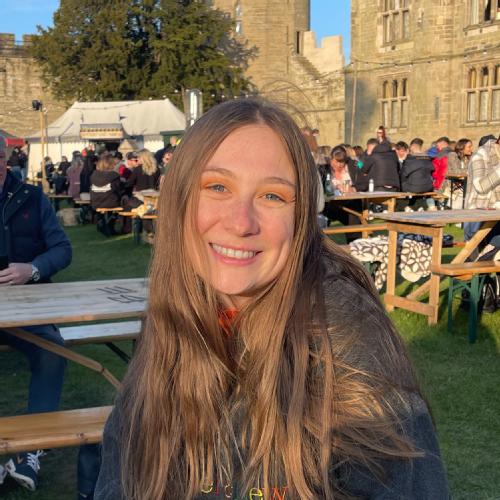
University of Warwick Previous Qualifications: First Class MBio Biomedical Science (Hons) from The University of Warwick About me: My desire to further my study in the form of a Ph.D. was largely motivated by research experience. I thoroughly enjoyed the research process I had in my undergraduate degree, generating hypotheses and developing protocols to test them, as well as problem-solving. I enjoy the challenge of problem-solving and find it highly rewarding, which is why I wanted to pursue a research PhD. The MIBTP programme was particularly attractive to me due to its training year module which teaches you many skills that are desired by employers both in academia and industry. I was also told by older MIBTP students that the MIBTP support system is very good, which has so far been very true! My field of interest is Neuroscience, particularly with adenosine and its impact on epileptic seizures. Adenosine has been found to be one of the most potent neuromodulators which is capable of shutting down neurotransmission completely at synapses. Adenosine has even been shown to halt seizure activity. I am interested in investigating and developing adenosine-based compounds that could help prevent seizures. One of the major obstacles in this is that adenosine has effects in other areas of the body, including the cardiovascular system. It is, therefore, not possible to directly inject adenosine into the bloodstream to treat seizures as this could cause major complications outside of the brain. The biggest challenge is to develop compounds or mechanisms of delivery that are specific to the pro-epileptic regions of the brain. This is what I hope to contribute to during my Ph.D. I would recommend applying to the MIBTP as you are given so many opportunities throughout the programme to develop the skills you want to develop, not necessarily the skills that are 'expected' of a typical PhD student. There is a lot of flexibility within the course (you can practically rearrange 3/4 of your first year based on what you would like to complete first and the opportunities that become available to you!) and several opportunities to do research completely unrelated to your proposed Ph.D. project. |
Training Year Q&A
The following question and answer pages were created by MIBTP students. They answer the most common questions regarding the MIBTP programme and provide tips and ideas for organising accommodation, mini-projects and PIPS. It is worth reading all of them, not just those which seem to correspond to you best (e.g. same University, department) as they are short and all contain valuable insights.
| Parisa Pordelkhaki |
Anjana Radhakrishnan |
|||
|
|
PIPS Case Studies
Our students carry out a wide range of exciting professional internships during their PhD training programme doing activities that interest them and in several cases lead to ongoing interaction. We have highlighted some of the internships here.
Cathal Meehan (2017 student)
Cathal undertook his placement in the Moroccan capital of Rabat, working with the International Centre for Agricultural Research in the Dry Areas (ICARDA). Cathal was given the opportunity to chose where within the organisation he wanted to work during his placement, which enabled him to gain experience within the areas that interested him the most. He decided to work mainly with agronomists and breeders involved with wheat and barley to see how scientific research was being translated to improve the livelihood of smallholder famers.
The placement involved a number of different tasks, from designing trials to test various cereal lines, to conducting regular visits to Marchouch, one of ICARDA’s major field research sites and attending the annual meeting of all of the directors of the CGIAR (ICARDA is 1 of 15 organisations in the Consultative Group for International Agricultural Research - CGIAR).
During his time off, Cathal also got to take trips across the diverse culture and landscape of Morocco, which were organised regularly with staff and others he'd met in Morocco; journeying from the humble rural farms of the atlas plateau to the bustling medinas of Marrakech, and from the Rif mountains to the eternal Sahara Desert.
Cathal said, "By far I felt the biggest advantage of being at one the CGIAR’s main centres was engaging with other plant scientists who knew what prospects were out there for adventurous young scientists. The insights they gave me into the industry and real-world application of new agricultural technologies was absolutely invaluable. Building these connections and learning the lay of the land this early in my PhD will allow me to tailor my research and skill development to pursue a fulfilling career in food security."
Curtis Oliver-Smith (2016 student)
Curtis spent 3-months working at the Royal Society for his PIPS, within the public affairs team. During the placement, he was able to attend the Annual Links day (27thJune 2017) event in Parliament. During his placement he also worked on the Royal Society’s annual Summer Science Exhibition. This event was the main focus of his work in the Public Affairs team. He was tasked with inviting MPs to the event that within their constituency, holds one of the institutions taking part in the 22 exhibits. In doing so he communicated with the lead researchers of the exhibits, mailed and maintained contact with around 30 MPs, created a press release for the attending MP’s, organised the photography and created briefings on both the researchers and MPs. With the general election being called so close to the event and the change in MP’s, this became a challenging and tall order on a very tight schedule. Curtis commented, " I hold the Summer Science Exhibition close to my heart and I am very proud of the important role I have played. Overall, I have loved the fast paced environment and the office life, but most of all I am hugely grateful to the Public Affairs team for having me, what a great bunch of excitable, but professional people they are! It’s been an honour and pleasure and I hope to return in the future."
Daniel Cooper (2015 student)
Daniel's PIPS was conducted at "Equinox Graphics Ltd." a 3D design company based in Trumpington, Cambridge, who specialise in providing scientific animations and images to the space and medical industry. His first month was spent training with specialist software (Luxology's Modo, and Adobe After Effects), the second applying learned concepts to help the company with current work (for the BBC and for Cambridge's Pint of Science event) and the third month working on a personal project - an animated journey into hippocampal synaptic transmission in collaboration with Prof. Bruno Frenguelli at the University of Warwick. The work environment was stimulating and enjoyable, and he was allowed full freedom in his choice of personal project and received excellent training.
Daniel stated, "I am happy with my time away at my PIPS, have learned many useful and unique skills that will allow me to communicate my research more effectively in the future and am proud of the work I have been allowed to accomplish!"
Esther Ogunniyi (2013 cohort)
Esther carried out her placement at the HGCA. The aim of her placement was to gain an insight into the activities carried out by the HGCA in helping cereals and oilseed growers in the UK. To achieve this aim, Esther was actively involved in attending meetings such as research manager meetings, science forum meetings and departmental meetings. She also managed the analysis and interpretation of questionnaires used in formulating research plans for 2015 – 2019. In addition to that, Esther was privileged to do literature review on soil information available to growers in UK; this is intended to serve as base line information for reviewing RB209 fertilizer manual in the near future. During her placement, she also visited one of the HGCA trial fields and a Biodiversity Farm in Wellingborough, Northants. The trial fields provide information used in compiling cereal ‘Recommended List’ for growers.
Elise Facer-Childs (2013 cohort)
Elise carried out her PIP at an occupational psychology firm in West London called Team Focus Limited (www.teamfocus.co.uk). This was because she was interested in how a business runs and also how psychology could interlink with her research interests. Her roles within Team Focus involved various different components within the business including digital marketing, market research, increasing social media coverage, website design and creation, client account management, training administration and psychometric testing.
Overall Elise feels like her PIP was extremely successful and useful for both the company and herself. It helped her understand more about the possibilities in industry and the integration of research and business. It was a fantastic opportunity given by BBSRC that she really enjoyed.
Kathryn Styles (2012 cohort)
Kathryn did her three month placement at the World Health Organization in Geneva working in the department of ‘Essential Medicines and Health Products’, proofreading the 2013 Priority Medicines for Europe and the World Update Report and associated background papers. During this internship Kathryn attended World Health Day as well as the 66th World Health Assembly held in the UN palace.
Claire Stoker (2012 Cohort)
Claire completed her 3 month placement with the British Society for Plant Pathology (BSPP). The BSPP was founded in 1981 for the study and advancement of plant pathology. During her placement, Claire joined their outreach team, for which she attended the UK Plant Science Conference 2013 in Dundee. Claire put together a report about the conference which was published on the BSPP website.
Andrew Tock (2012 Cohort)
Andrew spent 3 months on placement in Uganda with the Centre for Agricultural Bioscience International (CABI). CABI is a UK-based non-profit organisation that helps resource-poor farmers in developing countries to increase yields by preventing crop losses to pests, diseases and environmental stresses. Andrew's role involved monitoring the performance of the CABI plant clinics by assessing different aspects of their operations, such as the quality of diagnoses and advice, staff communication, organisation and record keeping.